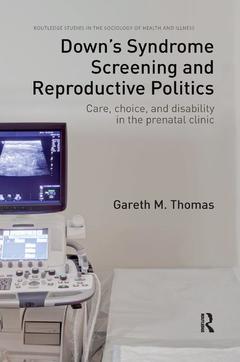Description
Down's Syndrome Screening and Reproductive Politics
Care, Choice, and Disability in the Prenatal Clinic
Routledge Studies in the Sociology of Health and Illness Series
Author: Thomas Gareth M.
Language: English
Subjects for Down's Syndrome Screening and Reproductive Politics:
Keywords
Syndrome Screening; Prenatal Screening and the Politics of Reproduction; Nuchal Translucency; An Ethnography of Down’s Syndrome Screening; Patau Syndrome; Gareth Thomas; FMD; reproductive choice; Higher Risk Result; antenatal provision; Non-directive Care; eugenics; Thanatophoric Dysplasia; risk; Prenatal Screening; prenatal testing; Advanced Maternal Age; biomedical technologies; Maternity Care Assistants; values; NIPT; choice; Edward’s Syndrome; Lower Risk Result; Prenatal Clinic; Negative Pregnancy Outcome; Mrs Reed; Free Beta Human Chorionic Gonadotrophin; Mrs Hunt; Mrs Fox; UK Geneticist; Triple Screening; Maternal Age Risk; Foetal Medicine Department; Quadruple Screen; Triple Screen
Publication date: 05-2019
· 15.6x23.4 cm · Paperback
Publication date: 03-2017
· 15.6x23.4 cm · Hardback
Description
/li>Contents
/li>Readership
/li>Biography
/li>
Nominated for the Foundation of Sociology of Health and Illness Book Prize 2018
In the UK and beyond, Down?s syndrome screening has become a universal programme in prenatal care. But why does screening persist, particularly in light of research that highlights pregnant women?s ambivalent and problematic experiences with it?
Drawing on an ethnography of Down?s syndrome screening in two UK clinics, Thomas explores how and why we are so invested in this practice and what effects this has on those involved. Informed by theoretical approaches that privilege the mundane and micro practices, discourses, materials, and rituals of everyday life, Down?s Syndrome Screening and Reproductive Politics describes the banal world of the clinic and, in particular, the professionals contained within it who are responsible for delivering this programme. In so doing, it illustrates how Down?s syndrome screening is ?downgraded? and subsequently stabilised as a ?routine? part of a pregnancy. Further, the book captures how this routinisation is deepened by a systematic, but subtle, framing of Down?s syndrome as a negative pregnancy outcome. By unpacking the complex relationships between professionals, parents, technology, policy, and clinical practice, Thomas identifies how and why screening is successfully routinised and how it is embroiled in both new and familiar debates surrounding pregnancy, ethics, choice, diagnosis, care, disability, and parenthood.
The book will appeal to academics, students, and professionals interested in medical sociology, medical anthropology, science and technology studies (STS), bioethics, genetics, and/or disability studies.
Chapter 1. Introduction
Chapter 2. A Short Socio-History
Chapter 3. Hands-Off Work
Chapter 4. The Conduct of Care
Chapter 5. Constituting Risk and Disability
Chapter 6. Expectant Parents, Expecting Perfection
Chapter 7. Summary and Discussion
Gareth M. Thomas is a Lecturer in Sociology in the School of Social Sciences at Cardiff University. He is a sociologist who is interested in – among other things – medicine, disability, stigma, reproduction, health and well-being, technology, place, and interaction.




